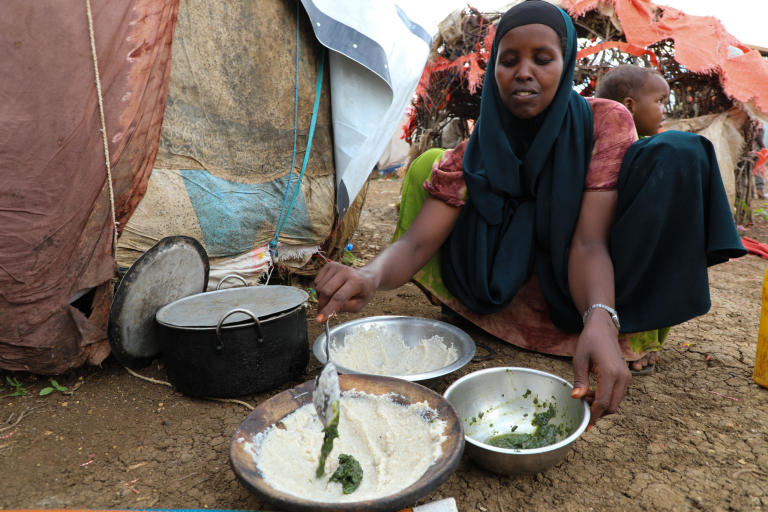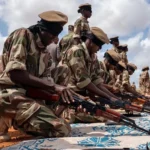Adia Murshid
One the most important things for habitats to survive is water and food, over the centuries humans have cultivated and revolutionized their food chains, rations and production styles, in what leads to globally, One-third of food produced for human consumption is lost or wasted worldwide. This amounts to about 1.3 billion tons per year, worth approximately US$1 trillion. on the other side of the world, dozens of people in developing world are everyday suffering to bring food on their plates and to access clean water in their homes.
Struggling global food chains already fueled by climate change, locust swarms and political instability are now levelled up by the recent covid-19 and current Russian-Ukraine war into the worst-case scenarios possible.
Only in east Africa, 22 million people are affected by the current drought and made other 7 million people move away from their homes. according to Oxfam and save the children for every 84 seconds a person is estimated to be dying of starvation in Ethiopia, Somalia, and Kenya. although the drought affected all of the region severely, the case in Somalia is far worse than all compared to their counterparts in struggle, mainly due to, very poor government service provision, economic conditions, difficult of aid reach, urbanization and access to education.
Causes of recuring droughts and famines in Somalia
In the last decade only, three major droughts and two famines have been recorded in Somalia, and more unrecorded others occurred throughout the history. though economic, political and social conditions were different in times, there was always one similar effect that consistently caused droughts and famines in the country- it’s when rainfall seasons fail to fall.
due to the reliance on natural resources such as harvesting and herding animals, it was always challenging for the majority of Somalis to cope up and survive in such hard times, find another source of income when the rivers dry up and the sky never turns into grey. Owing to the fact that more than half of the population lives in rural eras of the country, such dire conditions were always a devastating one for all people in the country.
still in today, in an era of modernization, Somalis yet seem far from changing their behavior and primitive cultures to learn from their brutal past and shape their future into a better one.
Certainly, there are plenty of reasons why famine and droughts were always in the status quo in Somalia, some are internal factors and some are external factors, to spell out on the threshold of this issue, I try my best here, to emphasize on the very tail of this problem. And discover its genesis.
Internal factors
When there is a shock events like famines and floods in the country, those factors are not claimed and criticized enough, people tend to frequently ask for aid from the world. And for the elites including politicians, leaders and even academics, to escape from the complaining and accountability, they themselves send the massages across the globe despite continuing their luxurious lives and fantasy meetings- and worse, fight for their own self-interests despite the mess.
To those effect, people seem to lose their way, and elites simply fallow the footsteps of the masses. To simply understood, when there is a wound in your body, you have to first find a cure for yourself and then try your best to avoid such harm again, but by asking others to cure your own wound and not by yourself to do it, won’t solve the problem ever and worse- will only eventually encourage you to do it again. Unfortunately, that is what we are doing now.
Logically when such troubles happen, we have to blame ourself first and try to overcome it by any means possible and then try our best to not fall into the same dig again, here are some internal reasons in my point of view of why poverty, famines and droughts re-occur all the time in Somalia.
Poor system– As distinguished economist Amartya Sen emphasized it, poverty is not just relative, but also absolute. He defined poverty as a failure to achieve certain minimum capabilities and, according to him, the lack of capabilities is absolute. However, capabilities are not fixed over time or over societies. Hence, Poverty is more off a system-driven than by otherwise, and people create systems, thereupon it’s up to people and their own established systems to eradicate poverty that solves it or sustains it.
Unequivocally, Societies tend to address and tackle their own challenges, such as poverty, lack of education, corruption, poor infrastructure and so on, and to do so, they ought to give legitimacy to some people of them to mediate them, come up with a plan, long-lasting solutions and discourse their own issues, that is called government. unfortunately for Somalis in decades, they are yet struggling and failing to produce one, a government of the people, for the people and by the people.
Due to the rigidity of the system that produces them, it only gives legitimacy to poor individuals upholding the name of government that only care about their own self-interests and not expectedly address the nationwide issues. and as for a fragile state- the countries current political status- they only create fragile conditions that just hardens the lives of its citizens, moreover damages it, let alone solve their quagmires. it’s somewhat madness to expect the other way around. Beyond any doubt, all of existing hazardous situations in the country such as poverty, droughts and famines are mainly the result of poor governance and government and the very bad systems that established them in firsthand. That needs to change.
Too much taxes- hard Taxes are levied on farmers and local businesses both direct and indirect ways, farmers and ranchers bear the burden mostly. it subsequently makes their production costs soar and their profits crumble.
directly they provide taxes to regional states, federal government and al-Shabaab, but they pay double the cost indirectly to illegal controls and a gunman on the streets. evidently, the cost of delivering goods from farming stations to the port of Mogadishu for shipments is far more than the cost of delivering it to importing nations like UAE and SAUDI ARABIA.
For a rural resident to pay that huge amount of taxes enables them to obtain a higher income, to reserve some of their earnings to use it when livestock cannot be reared and rainfall seasons fail to drop down. As a result, they usually pay most of their incomes on necessities and for harvesting materials, such as fertilizers, aprons, pruners- and to sustain their own herding.
Farmers and ranchers pay too much of the so-called taxes that when they can’t bear it, they simply exit the market too early. That also crumbles the total production of agricultural products in the economy, which will eventually accelerate prices of farming products in local and international markets.
Food storage problems– In peak and prosper periods, when the rain never fails to deliver its magic drop of precipitation, seeds of trees grow anywhere, water flows everywhere, wheat, sorghum and fruits overproduced, people in rural areas tend to waste tons of foods and fruits for enjoyment. they usually behave like wet seasons will never arrive, drought and famines will never knock on their doors coming, they hardly try to store some additional foods like wheat and sorghums using a common Traditional storage element known as bakaar– to utilize it when calamity is on the edge.
Apparently, when droughts and famines arrive, they subsequently have nothing to eat or consume to survive for some time, they consequently suffer in the ashes of death- children and elder people are the first on the line as they are the weakest part of every family in hard times.
Certainly, that behavior most change by any means, and it’s the role of rural people to change it first, and for the government and NGOs to deliver materials and mechanisms of modern food-water storage systems and repository to them if they really want to help.
External factors
External factors play a major role in bringing up the problem of droughts and famines in Somalia, those factors usually arise around the globe, most of them- from the developed world, it’s not only us that suffer in the consequences of those effects but also other poor and developing nations as well, it isn’t in our hands to prevent and control them, but we can do our best to live by it, only a collective hand altogether can change them, those factors include.
Climate change- In the case of Somalia, climate change effects are both devastating and sad story. a recent world bank report indicates that for a fragile context like Somalia, due to their dependence of natural resources and man-made degradation of natural resources such as charcoal production and overgrazing could make the country more vulnerable to poverty and food insecurity, and for recent shocks such as floods, droughts and locust infestations are a result of climate-induced shocks.
according to multiple sources, climate change negatively impacts agricultural and food production, limits access to food, decreases the national value of food and increases food waste. as climate models predict higher average temperatures around the world and hotter extremes, rising sea levels in coastal areas and more frequent droughts in other areas. It’s estimated that global hunger, floods and famines will increase as poor nations will be victimized the most.
Climate change effects can be directly seen in Somalia, for the first-time in recent history, rainfall seasons fail in three consecutive seasons- fourth season is predicted to fail as well, frequent floods never seen before fallow and due to the higher temperatures, sorghum, soybeans and maize productions fell down.
Locust swarms – in February this year, Somalia declared state of emergency over locust swarms, locust invasion have hit the farming lands in rural areas very hard and destroyed almost all of croplands in the country, according to a late report published on the conversation, Grangerization of these locusts to form swarms is linked to rainfall and in some cases irrigation of cereal crops. The current swarm is probably due to the heavy rains received in the area in January. Flooding and high rainfall allow the locust to expand the area in which it can lay eggs, each of it eats its weight of food.
For farmers, the locusts further threaten their food security and their ability to access pasture for livestock. These impacts on the food cycle could drastically threaten livelihoods, erode people’s savings, and push people further into poverty.
it is not the first-time, locust swarms thwacked the country like this, it occurred many times in the past, and will happen in the coming years if not addressed well.
A wake-up call
According to UN, around 829 million worldwide go to bed hungry each night, and around 1 billon people – most of them children under the age of 5 face dire situations like malnourishments and starvation. As a result, in September 2015, the world together set the goal of targeting zero hunger through sustainability goals in 230.
World hunger already fueled by droughts, wars, political instability likewise, current unexpected shocks of covid-19, Ukraine-Russia war escalated the situation into its worst stages ever. Developing countries including Somalia suffer the most of those effects as they are the most vulnerable of all.
consequently, to those shocks the world is changing by renovating their water resources and food security policies to build socially just and ecologically sound future for their children.
Off all the major collapses that shaped the lives of Somalis in the pasts, it’s time for us now more than ever to wake-up from the long sleep we have had in decades and to come up with a long-lasting solution to our own challenges incorporate to poverty, famines and stability, tackle the root causes of it not to treat its side effects.
And to all intents and purposes, no amount of world aid and help can do that, except us altogether.
Adia is an Economics graduate student working towards achieving SDGs. He is interested in food security, monetary and welfare economics. Contact him on [email protected]




